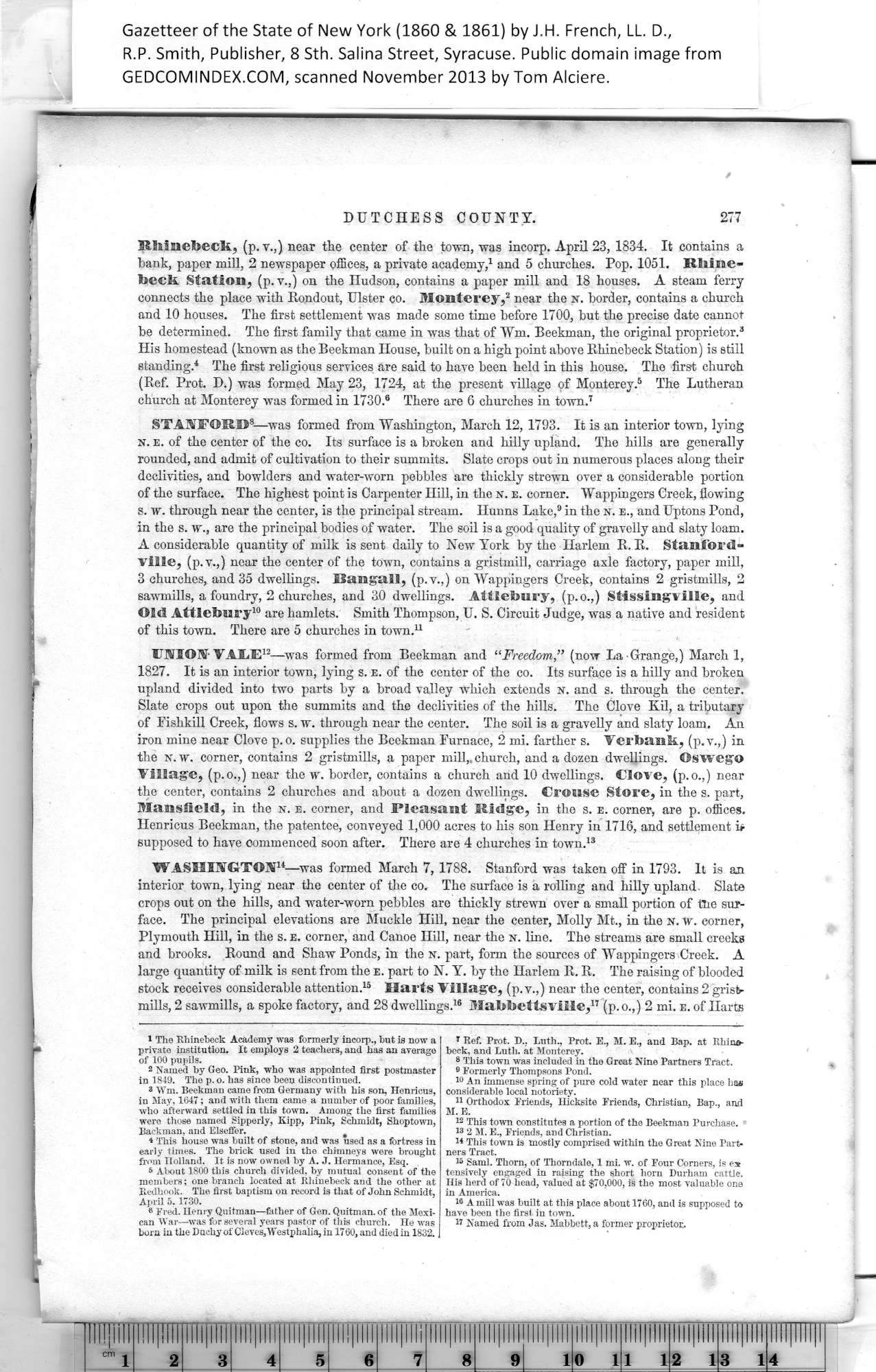|
DUTCHESS COUNTY. 277
Rhinebeck, (p. v.,) near the center of the town, was incorp. April 23, 1834. It contains a
bank, paper mill, 2 newspaper offices, a private academy,1 and 5 churches. Pop. 1051. Rhine¬
beck Station, (p.v.,) on the Hudson, contains a paper mill and 18 houses. A steam ferry
connects the place with Rondout, Ulster co. Monterey,2 near the n. border, contains a church
and 10 houses. The first settlement was made some time before 1700, but the precise date cannot
be determined. The first family that came in was that of Wm. Beekman, the original proprietor.3
His homestead (known as the Beekman House, built on a high point above Rhinebeck Station) is still
standing.4 The first religious services are said to have been held in this house. The first church
(Ref. Prot. D.) was formed May 23, 1724, at the present village of Monterey.5 The Lutheran
church at Monterey was formed in 1730.® There are 6 churches in town.7
STANFORD 8—was formed from Washington, March 12, 1793. It is an interior town, lying
n. e. of the center of the co. Its surface is a broken and hilly upland. The hills are generally
rounded, and admit of cultivation to their summits. Slate crops out in numerous places along their
declivities, and bowlders and water-worn pebbles are thickly strewn over a considerable portion
of the surface. The highest point is Carpenter Hill, in the n. e. corner. Wappingers Creek, flowing
s. w. through near the center, is the principal stream. Hunns Lake,9 in the n. e., and Uptons Pond,
in the s. w., are the principal bodies of water. The soil is a good quality of gravelly and slaty loam.
A considerable quantity of milk is sent daily to New York by the Harlem R. R. Stanford-
ville, (p.v.,) near the center of the town, contains a gristmill, carriage axle factory, paper mill,
3 churches, and 35 dwellings. Rangall, (p.v.,) on Wappingers Creek, contains 2 gristmills, 2
sawmills, a foundry, 2 churches, and 30 dwellings. Attletoury, (p.o.,) Stissingville, and
Old Attlebury4 are hamlets. Smith Thompson, U. S. Circuit Judge, was a native and resident
of this town. There are 5 churches in town.5
UNION VAEE6—was formed from Beekman and "Freedom " (now La Grange,) March 1,
1827. It is an interior town, lying s. e. of the center of the co. Its surface is a hilly and broken
upland divided into two parts by a broad valley which extends nr. and s. through the center.
Slate crops out upon the summits and the declivities of the hills. The Clove Kil, a tributary
of Pishkill Creek, flows s. w. through near the center. The soil is a gravelly and slaty loam. An
iron mine near Clove p.o. supplies the Beekman Furnace, 2 mi. farther s. Verbank, (p.v.,) in
the n. w. corner, contains 2 gristmills, a paper mill,, church, and a dozen dwellings. Oswego
Village, (p.o.,) near the w. border, contains a church and 10 dwellings. Clove, (p.o.,) near
the center, contains 2 churches and about a dozen dwellings. Crosise Store, in the s. part,
Mansfield, in the n. e. comer, and Pleasant Ridge, in the s. e. corner, are p. offices.
Henricus Beekman, the patentee, conveyed 1,000 acres to his son Henry in 1716, and settlement if-
supposed to have commenced soon after. There are 4 churches in town.13
WASHINGTON14—was formed March 7, 1788. Stanford was taken off in 1793. It is an
interior town, lying near the center of the co. The surface is a rolling and hilly upland- Slate
crops out on the hills, and water-worn pebbles are thickly strewn over a small portion of tlie sur¬
face. The principal elevations are Muckle Hill, near the center, Molly Mt., in the n. w. corner,
Plymouth Hill, in the s. e. corner, and Canoe Hill, near the n. line. The streams are small creeks
and brooks. Round and Shaw Ponds, in the n. part, form the sources of Wappingers Creek. A
large quantity of milk is sent from the E. part to N. Y. by the Harlem R. R. The raising of blooded
stock receives considerable attention.15 Haris Village, (p.v.,) near the center, contains 2 grist¬
mills, 2 sawmills, a spoke factory, and 28 dwellings.16 Mabtoettsviile,17 (p.o.,) 2 mi. e. of Harts
|
7 Ref. Prot. D.. Luth., Prot. E., M. E., and Bap. at Rhind-
beck, and Luth. at Monterey.
8 This town was included in the Great Nine Partners Tract.
8 Formerly Thompsons Pond.
10 An immense spring of pure cold water near this place has
considerable local notoriety.
11 Orthodox Friends, Hicksite Friends, Christian, Bap., and
M. E.
12 This town constitutes a portion of the Beekman Purchase.
18 2 M. E., Friends, and Christian.
11 This town is mostly comprised within the Great Nine Part¬
ners Tract.
18 Sami. Thorn, of Thomdale, 1 mi. w. of Four Corners, is e*
tensively engaged in raising the short horn Durham cattle.
His herd of 70 head, valued at $70,000, is the most valuable one
in America.
1® A mill was built at this place about 1760, and is supposed to
have been the first in town.
U Named from Jas. Mabbett, a former proprietor.. |
1
The Rhinebeck Academy was formerly incorp., but is now a
private institution. It employs 2 teachers, and has an average
of 100 pupils.
2
Named by Geo. Pink, who was appointed first postmaster
in 1849. The p. o. has since been discontinued.
3
Wm. Beekman came from Germany with his son, Henricus,
in May, 1647; and with them came a number of poor families,
who afterward settled in this town. Among the first families
4
« Fred. Henry Quitman—father of Gen. Quitman, of the Mexi¬
5
can War—was for several years pastor of this church. He was
6
born in the Duchy of Cleves, Westphalia, in 1760, and died in 1832.
|
